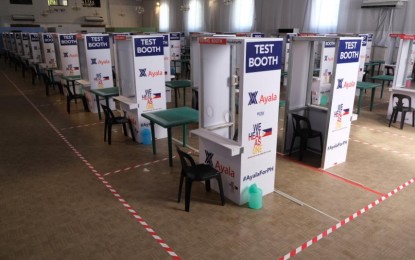
File photo
MANILA – Malacañang on Tuesday defended the use of rapid anti-body test kits for locally stranded individuals (LSIs) before they are sent back to their respective hometowns.
“Hindi po totoo ‘yan na palibhasa rapid test lang, hindi accurate (It’s not true that just because we use rapid tests, it means they are not accurate),” Presidential Spokesperson Harry Roque said in a virtual presser.
Citing findings of the Johns Hopkins University in the US, Roque said it is wrong to underestimate the usefulness of rapid anti-body test kits, stating that they could detect the presence of antibodies in an individual’s blood or serum even before symptoms of the coronavirus disease 2019 (Covid-19) start to show.
“Kung titingnan niyo ho ang IgM (immunoglobulin) ng rapid testing, between day zero – ibig sabihin miski wala ka pang sintomas – hanggang all the way to 35 days (If you look at the IgM of rapid testing, it can be detected between day zero, which means even before symptoms show, until 35 days),” he said.
Roque noted that while polymerase chain reaction (PCR) testing is considered the “gold standard” in Covid-19 testing, they could only successfully detect the virus from three to seven days from the onset of the disease.
"Bagamat sinasabi natin na gold standard ang PCR, epektibo lang siya kapag ang test ay mula three days from the onset of the disease until seven days. ‘Yun yung pinaka-accurate na resulta niya (Even if we say that PCR is the gold standard, it is only effective if the test is conducted three days from the onset of the disease until seven days. That’s when the results are most accurate),” he said.
The PCR test kits use nose and throat swab samples to find out whether a person is infected with Covid-19 while rapid anti-body test kits use blood samples, which are unable to detect the virus but instead measures a patient’s antibodies through the sample.
These tests are still subjected to PCR confirmatory tests.
Roque, however, explained that although LSIs undergo rapid anti-body testing in Metro Manila, they also undergo PCR testing and mandatory quarantine once they arrive in their respective hometowns.
According to him, about 6,000 LSIs are expected to be sent back to their hometowns during the first week of July.
LSIs were temporarily transferred to the Villamor Airbase Elementary School and the Philippine State College of Aeronautics while waiting for a bus or plane ride home.
Roque also assured that the government and private sector would accelerate their testing capacity by end of July to help achieve a positivity rate of 3 percent.
“Importante po na madamihan pa talaga natin ang mga test na ginagawa natin ngayon (It is important that we increase the number of tests we carry out),” he said.
On Monday, the government temporarily suspended the entry of LSIs in at least five areas due to the limited number of quarantine facilities that can accommodate them.
The Inter-Agency Task Force for the Management of Emerging Infectious Diseases (IATF-EID) has issued a moratorium on sending home LSIs to Western Visayas, Eastern Visayas, and Caraga regions; Cebu Island; and Mactan.
More than 34,000 LSIs have been sent to their respective hometowns through the “Hatid Tulong” program.
The “Balik Probinsya, Bagong Pag-Asa” program has been temporarily suspended to prioritize assisting LSIs in Metro Manila. (PNA)
